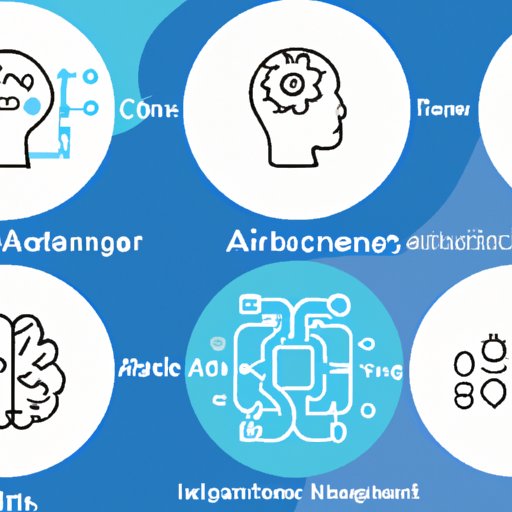Introduction
Artificial intelligence (AI) is a rapidly growing field with applications in almost every aspect of modern life. From virtual personal assistants to self-driving cars, AI has become an integral part of our lives. But how has AI impacted society? This article will explore the effects of AI on various aspects of our lives, from education to law enforcement and beyond.
Overview of Artificial Intelligence
At its core, AI is the science of building machines that can simulate or replicate human behavior. AI has been around since the 1950s, but recent advancements in technology have allowed it to be applied to a wide range of areas, from healthcare to transportation. AI is used to create intelligent systems that can learn, adapt, and make decisions based on data. AI can also be used for automation, simplifying and streamlining tasks that would otherwise be completed manually.
What is AI and How Has It Impacted Society?
AI has had a profound impact on society, from improving educational opportunities to transforming the way we work and live. AI has changed the way we interact with technology, allowing us to do more with less effort. AI has also enabled us to automate tedious and repetitive tasks, freeing up time for more creative pursuits. AI has made its mark in virtually every area of our lives, from healthcare to manufacturing and everything in between.

Impact of AI on Education
AI has had a tremendous impact on education, offering new ways to teach and learn. Automation has enabled teachers to manage large classes with ease, while intelligent tutoring systems can provide personalized instruction to students. AI-driven student assessment tools can help teachers identify areas where students need extra help, while automated grading systems can reduce the burden of grading assignments. AI can also be used to analyze student performance and provide personalized feedback.
Effects of AI on the Workplace
AI has had both positive and negative impacts on the workplace. On the one hand, automation and AI-driven productivity have increased efficiency in many industries. On the other hand, automation has led to job losses, as machines replace humans in certain roles. Despite this, AI can still be beneficial to employment, as it can open up new opportunities for those with the necessary skills. AI can also be used to optimize processes and increase accuracy, resulting in higher quality products and services.

The Role of AI in Healthcare
AI has revolutionized healthcare, enabling doctors to diagnose diseases quickly and accurately. AI-powered diagnostics can detect even the slightest abnormalities, allowing for early detection and intervention. AI can also be used to improve patient care, as it can be used to monitor vital signs and alert medical staff when necessary. AI-driven drug development can also lead to more effective treatments, as AI can be used to identify potential therapeutic targets and develop new drugs.
AI and Social Media
AI has had a major impact on social media, from algorithmic personalization to automated advertising. Algorithmic personalization enables platforms to tailor content to individual users, while AI-driven content moderation can help keep conversations civil and respectful. Automated advertising systems can target specific audiences with tailored ads, helping businesses reach the right people with their messages.

Automation and AI in Manufacturing
AI has been instrumental in transforming the manufacturing industry, from robotics and automation to AI-driven optimization. Automation has enabled manufacturers to increase production speed and reduce costs, while AI-driven optimization can help manufacturers identify areas for improvement and make more informed decisions. Automated quality control systems can also ensure that all products meet the highest standards of quality.
AI and Law Enforcement
AI has been adopted by law enforcement agencies around the world, from facial recognition to automated surveillance. Facial recognition technology can be used to identify suspects and verify identities, while automated surveillance systems can help police monitor high-crime areas. AI can also be used for predictive policing, using algorithms to predict where and when crime is likely to occur.
AI and Cybersecurity
AI is also playing an increasingly important role in cybersecurity, from automated data protection to AI-driven threat detection. Automated data protection systems can detect and respond to threats in real time, while AI-driven threat detection systems can help identify malicious activity before it becomes a problem. Machine learning can also be used to analyze vast amounts of data and detect anomalies, helping organizations stay ahead of cybercriminals.
Conclusion
AI has had a profound impact on society, from education to law enforcement and beyond. AI has enabled us to automate tedious tasks, freeing up time for more creative pursuits. AI has also revolutionized healthcare, improving diagnosis and patient care. AI has also transformed the way we interact with technology, from algorithmic personalization to automated advertising. Finally, AI has had a significant effect on cybersecurity, helping organizations stay ahead of cybercriminals. Overall, AI has had a transformative effect on our lives, and its influence on society is only set to grow.
(Note: Is this article not meeting your expectations? Do you have knowledge or insights to share? Unlock new opportunities and expand your reach by joining our authors team. Click Registration to join us and share your expertise with our readers.)
